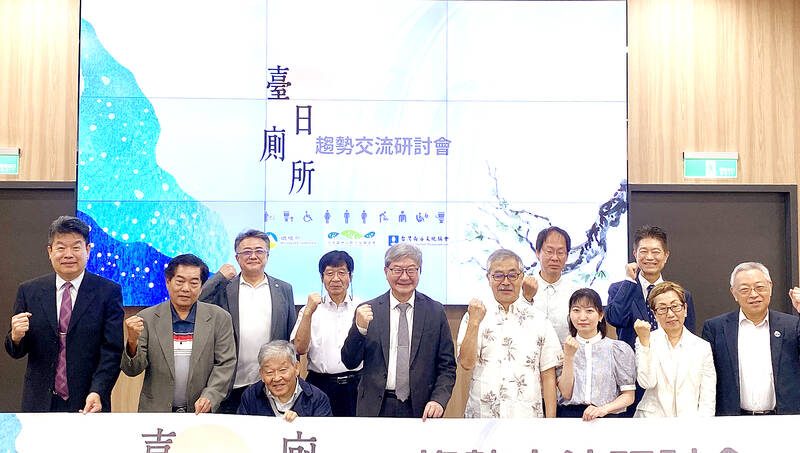The Ministry of Environment yesterday held a seminar in Taipei for experts from Taiwan and Japan to exchange their experiences on the designs and development of public toilets.
Japan Toilet Association chairman Kohei Yamamoto said that he was impressed with the eco-toilet set up at Daan Forest Park, adding that Japan still faces issues regarding public restrooms despite the progress it made over the past decades.
For example, an all-gender toilet was set up in Kabukicho in Tokyo’s Shinjuku District several years ago, but it caused a public backlash and was rebuilt into traditional men’s and women’s toilets, he said.

Photo: CNA
Japan Toilet Association director Mikiko Takahashi talked about her experience of inspecting public toilets in Japan’s Ishikawa Prefecture following the Noto Peninsula earthquake last year, saying that some toilets were damaged by the tsunami and remained unusable.
Japan has a policy that temporary toilets must be transported to earthquake-stricken areas if the seismic intensity reaches level seven or higher, but transportation requires three days in most cases, she said.
The delivery of temporary toilets was further delayed after the Noto Peninsula earthquake as many access roads were destroyed, Takahashi said.
Therefore, the Japanese government has developed a portable plastic toilet that can be placed on a toilet bowl, with excrement being wrapped up in emergencies or disasters where water is absent, she said.
A survey conducted in 2023 showed that more than 75 percent of Japanese prepared drinking water for disaster use, but only about 20 percent had emergency toilets prepared, Takahashi said, calling on the public to prepare one of these toilets in case of emergencies and to practice using it.
Environmental Protection Administration official Lin Yi-fang (林憶芳) said the ministry has listed more than 45,000 public restrooms for management nationwide, as well as funded the construction of 951 all-gender restrooms and 1,345 public restrooms at tourist sites.
The government would continue to promote all-gender restrooms, as such a design responds to the needs of gender-diverse people and helps reduce the waiting time for women at restrooms, she said, citing WHO data as showing that women wait twice as long as men to use a public toilet.
Friends of Daan Forest Park Foundation managing director Tsai Chien-sheng (蔡建生) said that a sitting toilet is the key to a healthy toilet culture and every user is responsible for keeping public restrooms clean.
Research showed that a squat toilet has 164 times more germs than a sitting toilet, as urine or excrement can easily splash out of the bowl, he said.
The proportion of public sitting toilets in Japan reached more than 99 percent in 2015 from 17 percent in 1963, while public squat toilets almost ceased to be manufactured over the same period, Tsai said.
Deputy Minister of Environment Shen Chih-hsiu (沈志修) said that public restrooms can represent a nation’s cultural depth and Japan has set an excellent example in this regard that Taiwan should try to learn from, especially with Taiwan becoming an aging society.
It is important for elderly people to have safe, convenient sitting toilets available for use while they are in public spaces, he said.

Nipah virus infection is to be officially listed as a category 5 notifiable infectious disease in Taiwan in March, while clinical treatment guidelines are being formulated, the Centers for Disease Control (CDC) said yesterday. With Nipah infections being reported in other countries and considering its relatively high fatality rate, the centers on Jan. 16 announced that it would be listed as a notifiable infectious disease to bolster the nation’s systematic early warning system and increase public awareness, the CDC said. Bangladesh reported four fatal cases last year in separate districts, with three linked to raw date palm sap consumption, CDC Epidemic Intelligence

The manufacture of the remaining 28 M1A2T Abrams tanks Taiwan purchased from the US has recently been completed, and they are expected to be delivered within the next one to two months, a source said yesterday. The Ministry of National Defense is arranging cargo ships to transport the tanks to Taiwan as soon as possible, said the source, who is familiar with the matter. The estimated arrival time ranges from late this month to early next month, the source said. The 28 Abrams tanks make up the third and final batch of a total of 108 tanks, valued at about NT$40.5 billion

Two Taiwanese prosecutors were questioned by Chinese security personnel at their hotel during a trip to China’s Henan Province this month, the Mainland Affairs Council (MAC) said yesterday. The officers had personal information on the prosecutors, including “when they were assigned to their posts, their work locations and job titles,” MAC Deputy Minister and spokesman Liang Wen-chieh (梁文傑) said. On top of asking about their agencies and positions, the officers also questioned the prosecutors about the Cross-Strait Joint Crime-Fighting and Judicial Mutual Assistance Agreement, a pact that serves as the framework for Taiwan-China cooperation on combating crime and providing judicial assistance, Liang

Reports of Taiwanese going missing, being detained or interrogated, or having their personal liberties restricted in China increased about fourfold annually last year, the Mainland Affairs Council (MAC) said yesterday. Last year, 221 Taiwanese who traveled to China were reported missing, were detained and interrogated, or otherwise had their personal freedom restricted, up from 55 the previous year, the council said. Reopening group tours to China would be risky, as it would leave travelers with no way to seek help through official channels after Beijing shut down dialogue between the associations tasked with handling cross-strait tourism, the MAC said. Taipei’s Taiwan Strait Tourism